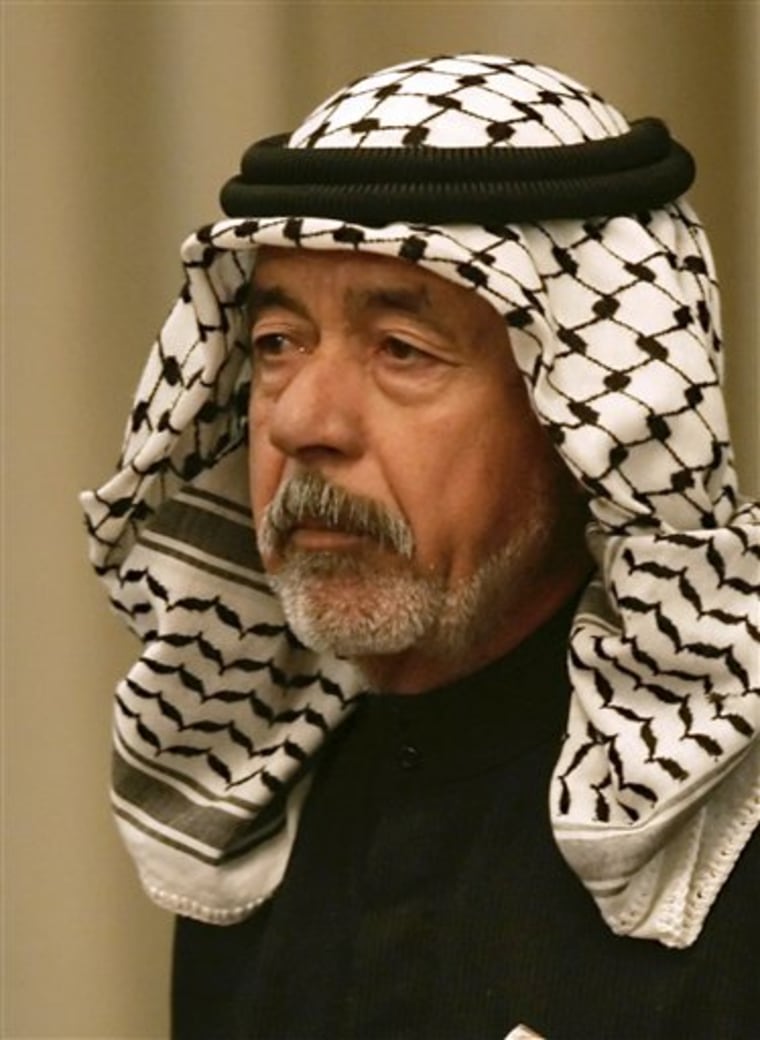Saddam Hussein's notorious cousin "Chemical Ali" was convicted and sentenced to death by hanging on Sunday for ordering the gassing of Kurds in 1988, killing more than 5,000 in the worst such attack ever against civilians.
It was Ali Hassan al-Majid fourth death sentence for crimes against humanity in Iraq. The previous three have not been carried out, in part because survivors of the poison gas attack on the Kurdish town of Halabja wanted to have their case against al-Majid heard.
Relatives of Halabja victims cheered in the courtroom when chief judge Aboud Mustafa handed down the guilty verdict against al-Majid, one of the chief architects of Saddam's repression and among the last to face trial.
Nazik Tawfiq, a 45-year-old Kurdish woman who said she lost six relatives in the attack, fell to her knees to pray upon hearing the verdict.
"I am so happy today," she said. "Now the souls of our victims will rest in peace."
In Halabja after the verdict, residents cheered and songs played from loudspeakers at a monument commemorating victims of the attack. Some in town visited the cemetery to remember loved ones who died in the gassing. The jubilation demonstrated again the deep-rooted hatred many Iraqis feel toward the former regime.
Another senior figure in Saddam's regime, former Foreign Minister Tariq Aziz, suffered a severe stroke over the weekend and cannot speak, his son said Sunday. Aziz was the international face of Saddam's regime for several years. He was convicted and sentenced to prison for his involvement in the forced displacement of Kurds in northern Iraq and the deaths of Baghdad merchants in the early 1990s.
Al-Majid earned his nickname because of his willingness to use poison gas against the Kurds. The 1988 killings remain a source of deep pain, particularly for Iraq's Kurds. Many in Halabja still suffer physically from the effects of the nerve and mustard gas that were unleashed on the village at the end of the Iran-Iraq War.
Sense of injustice
Survivors feel a sense of injustice that Saddam was hanged for the killings of Shiites following a 1982 assassination attempt, but did not live to face justice for the Halabja attack.
The gassing of the town was considered the most extensive use of chemical weapons on civilians in history.
The court also convicted and sentenced other former officials to jail terms on Sunday for their roles in the Halabja attack.
Former Defense Minister Sultan Hashim al-Taie faces 15 years in prison, as does Iraq's former director of military intelligence, Sabir Azizi al-Douri. Farhan Mutlaq al-Jubouri, a former top military intelligence official, was sentenced to 10 years.
Evidence against the defendants included eyewitness accounts, official documents and films seized after the fall of Saddam's regime, and military correspondence among commanders.
Al-Majid faces three previous death sentences for atrocities committed during Saddam's rule — particularly government campaigns against Shiites and Kurds in the late 1980s and early 1990s.
He was previously sentenced to hang for his role in a brutal crackdown against the Kurds in the late 1980s, known as the Anfal campaign, that killed hundreds of thousands.
The court later issued separate death sentences for his role in the 1991 suppression of a Shiite uprising and for a 1999 crackdown that sought to quell a Shiite backlash to the slaying of Grand Ayatollah Mohammed al-Sadr.
The earlier death sentences against al-Majid have not been carried out in part because of a desire by victims of the gas attacks to see him tried for one of the former regime's most vicious attacks.
Another obstacle was a political dispute involving al-Taie, who was also sentenced to death along with Chemical Ali in the Anfal trial.
Vice President Tariq al-Hashemi, a Sunni, and President Jalal Talabani, a Kurd, have both refused to sign the execution order against al-Taie, who signed the cease-fire with U.S.-led forces that ended the 1991 Gulf War. Al-Taie is a Sunni Arab viewed by many as a respected career soldier who was forced to follow Saddam's orders in the purges against Kurds.
The three-member presidency council must approve all death sentences, and the failure to find agreement on al-Taie delayed the execution of al-Majid as well.
Prime Minister Nouri al-Maliki, a Shiite, has pushed the presidency council to approve the death sentences pending against al-Majid and al-Taie.
Al-Taie surrendered to U.S. forces in September 2003 after weeks of negotiations. His defense has claimed the Americans had promised al-Taie "protection and good treatment" before he turned himself in.
Many Sunni Arabs saw his sentence as evidence that Shiite and Kurdish officials are persecuting their once-dominant minority by using their influence over the judiciary.
Another reason for the delay is that the Kurds from Halabja have also been pushing to have their day in court with al-Majid.
Mohammed Saeed Ali, a Kurdish city official in Halabja, said al-Majid ought to be hanged in Halabja to bring closure to victims' relatives.
"Chemical Ali massacred us and we want to see him getting what he deserves," he said.
